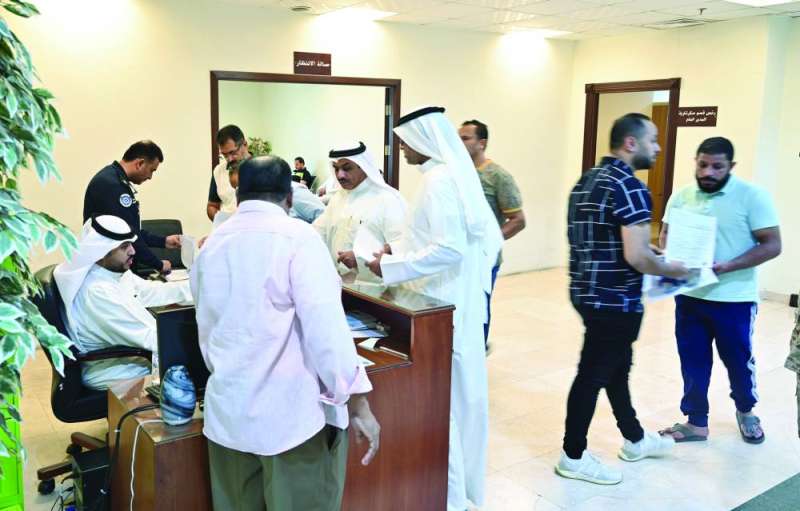Kuwait to crack down on illegal residents after June 17 deadline

• The deadline for illegal residents to correct their status or leave Kuwait is June 17.
• There will be no extension of the deadline. Those who do not comply will be deported and banned from entering Kuwait for life.
• There are centers open in the evenings from 3 PM to 8 PM, one in Mubarak Al-Kabeer Governorate, and the other in the Al-Riggae area, for those who want to leave immediately.
• Violators who do not have passports can obtain documents from their embassies.
The Ministry of Interior in Kuwait has only ten days remaining until its deadline for residency violators to fix their status or leave the country. The ministry is emphasizing its commitment to making the process easier for those who want to comply.
Over the past two months, residence departments across Kuwait have been busy. An average of 1,000 violators visit daily to address their residency issues.
Brigadier Mazid Al Mutairi, an Assistant Director General, spoke to Al-Rai newspaper. He highlighted the three-month grace period offered by the government.
This window started on March 17th and ends on June 17th. Al Mutairi called it a “golden opportunity” for violators. He stressed there will be no extensions and a strict security plan will be in place after the deadline.
Violators and those who help them will be caught quickly and firmly. Deportation and a lifetime ban on re-entering Kuwait are guaranteed.
During a visit to the Residence Affairs Department, Al Mutairi explained to Al-Rai’s reporters about the efforts to make the process smoother. Six departments handle requests to fix residency issues during regular work hours.
Additionally, there are two evening centers, one in Mubarak Al-Kabeer Governorate, and the other in the Al-Riggae area, that can help those who want to leave immediately. These evening centers are open from 3:00 PM to 8:00 PM and can help with fingerprint registration, data transfer, flight booking, and even getting to the airport for departure.
If a violator doesn’t have a passport, they can get travel documents from their embassy. The embassies are working with Kuwait to speed up this process for their citizens.

Deadline approaching for violators
As the grace period for residency violators to leave or adjust their status approaches its end on June 17, Kuwait’s security forces are set to launch extensive campaigns to ensure compliance.
The nationwide efforts will target all governorates and companies employing illegal workers. Violators will face detention, fingerprinting, and deportation, alongside investigations to identify their employers and those who harbored them.
Those deported will be banned from re-entering Kuwait and the Gulf Cooperation Council (GCC) countries for life, as per regional security agreements.
Individuals remaining illegally in the country are considered a threat to national security and public safety. Such individuals are often seen as high-risk and prone to criminal activities.
This strict approach comes under the directive of Major General Ali Al-Adwani, Assistant Undersecretary for Residency Affairs, who has formulated a comprehensive plan to tighten control over violators.
The era of leniency is over, and there will be robust enforcement against violators. Citizens and residents are urged not to shelter or employ violators and to report any such cases to the authorities.
Fines and adjustments
Violators wishing to leave will have their residency violation fines waived but must settle any debts to government entities, companies, or individuals before departure.
Those opting to adjust their status must pay their residency violation fines. The authorities have established six centers to assist violators with their status adjustments during morning hours and two centers in Mubarak Al-Kabeer and Riggae operating in the evenings from 3 PM to 8 PM for those wishing to leave.
These centers facilitate the fingerprinting process, data transfer, and ticketing, allowing immediate departure through the airport. For violators without passports, their embassies will provide the necessary travel documents, ensuring a smooth departure process.
No extension for grace period
The initial days of the grace period saw around 1,000 violators seeking assistance daily. Although the numbers have decreased, they are expected to rise as the deadline nears.
Efforts will continue even during the upcoming Eid holidays (June 14-17) to process violators before the deadline. There is no current plan to extend the grace period beyond June 17.
A significant number of violators benefiting from this period are men from Asian and African countries, with their departure processes taking less than 10 minutes.
An opportunity for compliance
This grace period offers violators a golden opportunity to regularize their status or leave and potentially return without hindrance. Adjusting one’s status allows for a dignified life, enabling work, education, and healthcare without the risk of legal consequences.
Post-deadline, violators caught will face deportation and a lifetime ban from Kuwait.
Security forces, organized into teams for each governorate, including specialized support teams, will enforce the law rigorously in all areas, including deserts, farms, and chalets, following the firm directives against leniency.
Addressing data gaps
A significant challenge encountered involves violators with children lacking proper documentation, posing a security risk.
Embassies have cooperated by issuing travel documents, ensuring these individuals can leave the country.
Maintaining robust security and accurate records is crucial for public safety.












